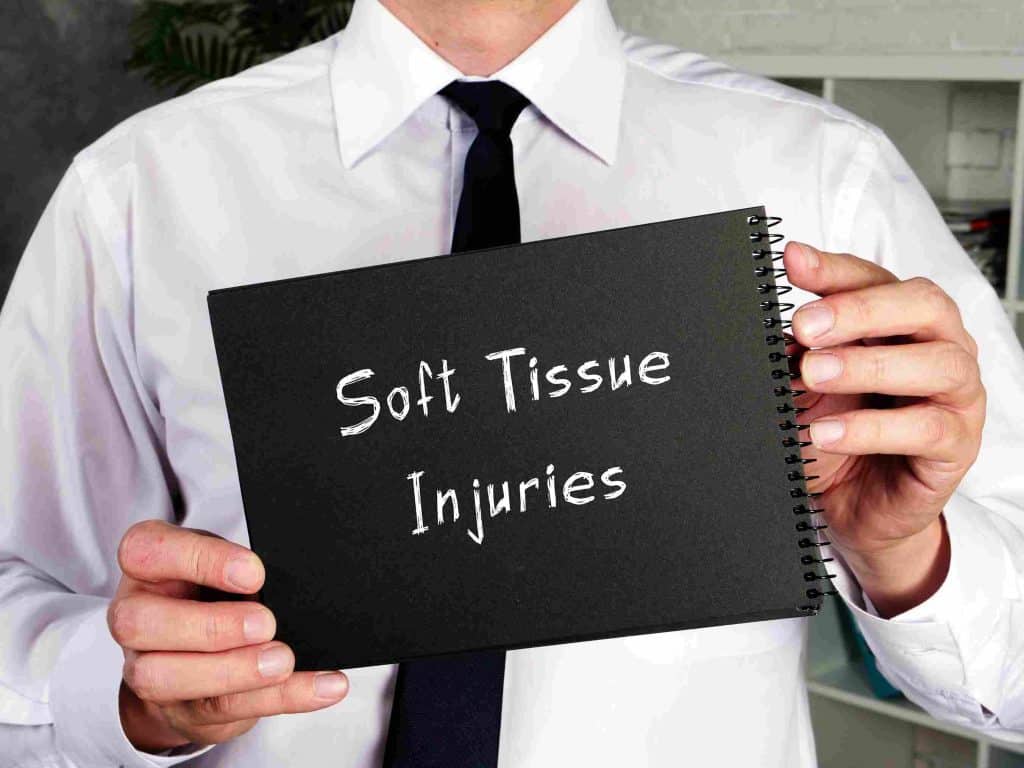Car accidents can cause many different injuries. You may sustain broken bones, experience emotional trauma, or deal with hidden injuries like internal bleeding. However, other injuries can occur, such as soft tissue injuries. Soft tissue injuries refer to injuries to the non-bony parts of your body such as ligaments, tendons, muscles, and the discs in your spine to name a few. While these may seem minor compared to the others, they can still significantly impact your life, health, and well-being.
Soft tissue injuries after an accident pose serious challenges. Not only are they hard to detect, but they could take time to show symptoms, leading to a delay in treatment. It is important to understand these injuries so you know the signs and what steps to take to put you on the path to recovery.
At Patterson Law Group, we understand the impact a car accident can have. If the negligence of another party caused your accident, you don’t have to bear the financial burden alone. Our experienced San Antonio car accident attorneys are here to help you recover the full compensation you deserve.
What Are Soft Tissue Injuries?
Soft tissue injuries are common outcomes of San Antonio car accidents. This is especially true in rear-end collisions or sudden stops.
As previously mentioned, these injuries affect the non-bony parts of the body and can encompass a range of issues, including:
Whiplash
Whiplash is one of the most well-known soft tissue injuries resulting from car accidents. It occurs when the neck is forcefully jolted back and forth, causing strain on the neck muscles and ligaments.
Sprains
Soft tissue sprains involve the stretching or tearing of ligaments, the tough bands of connective tissue that support joints. The wrists, ankles, and knees are often susceptible to sprains in car accidents.
Strains
Strains, on the other hand, affect muscles. They occur when muscles are stretched or torn due to sudden movements during a car accident. Common areas for muscle strains include the back and shoulders.
Common Symptoms of Soft Tissue Injuries
Recognizing soft tissue injuries is crucial for seeking timely medical attention and legal assistance. Common symptoms of these injuries include:
- Pain and Stiffness: Soft tissue injuries often lead to pain, soreness, and stiffness in the affected area. This discomfort can range from mild to severe.
- Swelling and Bruising: Swelling and bruising may develop at the injury site due to the body’s natural response to tissue damage.
- Limited Range of Motion: Injuries can restrict the normal range of motion in joints and muscles, making it difficult to move or perform everyday tasks.
- Tenderness to Touch: Soft tissue injuries are often tender to the touch, and even gentle pressure can cause pain.
- Delayed Onset: Some soft tissue injury symptoms, like whiplash, may not appear immediately after the accident but can manifest hours or days later.
Understanding these types of injuries and their symptoms can help individuals after a car accident. It enables them to seek appropriate medical treatment and legal counsel to deal with the aftermath.
Causes of Soft Tissue Injuries in Car Accidents
San Antonio car accidents can result in a variety of soft tissue injuries due to the forces in a collision. To help protect themselves, accident victims must understand how these injuries occur and the factors contributing to their severity.
Impact Forces
Car accidents often involve sudden and forceful impacts. When a vehicle stops suddenly or collides with another vehicle or object, the passengers inside are subjected to rapid deceleration. This abrupt change in motion can strain and damage soft tissues.
Whiplash Effect
In rear-end collisions, the most common type of car accident, the “whiplash effect,” is a leading cause of soft tissue injuries. It occurs when the head and neck are forcefully thrown forward and then backward, leading to neck strain and whiplash injuries.
Seatbelt Injuries
While seatbelts are crucial for safety, they can also contribute to soft tissue injuries. The sudden restraint provided by seatbelts during a collision can lead to chest, shoulder, and abdominal injuries.
Factors Contributing to Soft Tissue Injury Severity
Several factors can exacerbate the severity of soft tissue injuries in car accidents:
- Speed of the Collision: The higher the speed at which the accident occurs, the greater the force exerted on the occupants, increasing the risk and severity of soft tissue injuries.
- Position in the Vehicle: The position of an individual within the vehicle can impact the types and severity of soft tissue injuries sustained. Passengers in the front seats may be more prone to whiplash, while those in the rear may experience different types of injuries.
- Preexisting Conditions: Individuals with preexisting medical conditions or previous injuries may be more susceptible to severe soft tissue injuries in accidents.
Understanding these causes and contributing factors is essential for assessing the potential legal and medical implications of soft tissue injuries in car accidents.
Immediate Steps to Take After a Car Accident
The aftermath of a car accident can be confusing and chaotic. However, taking the right steps is essential. The steps to take immediately after a San Antonio car accident include:
Seek Medical Attention
After a car accident, the first and most crucial step is to seek immediate medical attention, even if you don’t feel pain right away. Soft tissue injuries may not show symptoms immediately, but a medical evaluation can detect hidden injuries. Prompt medical care ensures your well-being, provides you with a record of your injuries, and links them to the accident.
Document the Accident Scene
Documenting the accident scene is vital. Gather evidence by taking photos, obtaining witness statements, and exchanging information with other parties. Keep a detailed record of your medical treatment, expenses, and lost wages. This documentation is needed when pursuing compensation.
Why Legal Help Is Crucial
If you experience soft tissue injuries in a car accident, seeking help from experienced personal injury lawyers is recommended. Our attorneys understand Texas law and will advocate for your rights.
We can also help with insurance companies that may delay your claim or deny it. After years of working in this area of law, we understand the most common tactics insurance companies use.
You can count on us to negotiate and go to court if necessary. Injury-causing accidents can be scary, and taking legal action can be overwhelming, but you don’t have to go through this alone.
Proving Soft Tissue Injuries
Proving soft tissue injuries can be complex. However, this is crucial to secure fair compensation.
It is necessary to gather all medical documentation. This includes:
- Medical records
- Diagnostic tests
- Treatment plans
These documents help establish the severity and extent of your injuries. Other evidence that is beneficial includes witness testimonies and accident reconstruction. Using this helps to prove how the accident led to the soft tissue injuries.
Medical records serve as the foundation for proving soft tissue injuries. They provide a timeline of your treatment and validate your claims. In some cases, expert testimony from medical professionals may be necessary to explain the nature of soft tissue injuries, their impact on your life, and the correlation between the accident and the injuries.
Seeking Compensation
You may be entitled to several types of compensation after suffering a soft tissue injury caused by a car accident.
This includes medical expenses covering all treatment costs, from doctor visits to physical therapy. Additionally, you may be eligible for compensation for lost wages if your injuries hinder your ability to work. Pain and suffering damages are also possible, reflecting the physical and emotional distress caused by the injuries.
Obtaining fair compensation for soft tissue injuries can be challenging. Insurance companies may undervalue your injuries or dispute their connection to the accident. Legal assistance is vital to ensure you are not shortchanged. Our experienced attorneys at Patterson Law Group are ready to help you during this difficult time.
Preventing Soft Tissue Injuries
To reduce the risk of soft tissue injuries in car accidents, consider these tips:
- Adjust your headrest to the proper height to minimize whiplash.
- Ensure proper seatbelt use for all occupants.
- Follow safe driving practices, including maintaining a safe following distance and obeying speed limits.
- Avoid distractions like texting or talking on the phone while driving.
- Promote safe driving practices.
Safe driving practices are the best prevention. Always drive attentively, avoid aggressive driving, and be cautious in adverse weather conditions. Being a responsible driver protects yourself and contributes to safer roads for everyone.
Contact Patterson Law Group for Help with Your Car Accident Claim
Understanding soft tissue injuries after a car accident is crucial. If you’ve experienced a car accident, don’t hesitate to contact us for expert guidance and support. Your well-being and legal rights matter.





